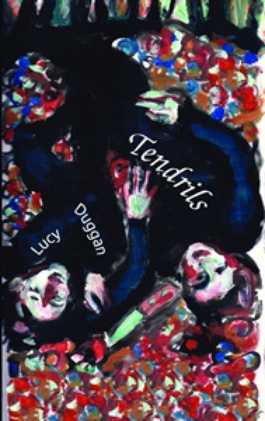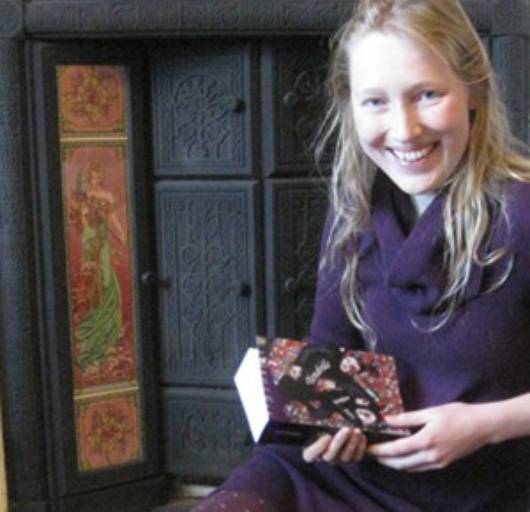
A Book of Many Roots
Published on
Translation by:
Rosamund MatherA knife with a life, a friend thought to be dead but may not be: with attention to whimsical detail, the novel Tendrils relates the great themes in life. Dreams and reality lie close together in Lucy Duggan's debut novel.
When I met Lucy Duggan in Strasbourg in 2011, at first I thought she was French. After ten minutes of Lucy looking down at me confusedly from her hostel bed, and me just continuing to babble on in French, the misunderstanding was cleared up - Lucy was a Brit and at that, a Brit that spoke very good German. No wonder, seeing as language is Lucy's passion. When I interviewed her for Die Euros, she said, 'I like the idea of mixing languages up a bit'. Now Lucy has published her first novel, Tendrils (Peer Press) and the first thing that stands out is, of course, language. Lively, poetic, beautiful and moving.
THE CITY AS DESTINY
 Tendrils sounds about right as a title, since the various plotlines are so artfully woven together that they only gradually get untangled, until the crux of the tale comes to the surface. But what is this crux? That would be firstly the story of the artists Ochre and Tomáš. They were once best friends living and working together in pre-revolutionary Prague: Tomáš always the leader of the two, politically active and bold, admired by the somewhat passive Ochre. But those times are long gone, as Tomáš fell from a bridge. Ochre, now in his forties, still lives in Prague, drifting around in a life still typically bohemian: 'He would live there in the swirl and flicker of endless puppet shows, and in the romance of ancient stories. The city was his fate, it was part of him and it was someone he was always searching for.' But one day Ochre's perception begins to shift, strange things begin to happen, and suddenly, he is certain that Tomáš isn't dead after all. Bit by bit, he puts together the real story behind his friend's disappearance.
Tendrils sounds about right as a title, since the various plotlines are so artfully woven together that they only gradually get untangled, until the crux of the tale comes to the surface. But what is this crux? That would be firstly the story of the artists Ochre and Tomáš. They were once best friends living and working together in pre-revolutionary Prague: Tomáš always the leader of the two, politically active and bold, admired by the somewhat passive Ochre. But those times are long gone, as Tomáš fell from a bridge. Ochre, now in his forties, still lives in Prague, drifting around in a life still typically bohemian: 'He would live there in the swirl and flicker of endless puppet shows, and in the romance of ancient stories. The city was his fate, it was part of him and it was someone he was always searching for.' But one day Ochre's perception begins to shift, strange things begin to happen, and suddenly, he is certain that Tomáš isn't dead after all. Bit by bit, he puts together the real story behind his friend's disappearance.
The second plotline tells of two friends, Zuzana (Zuzi) and Alena, who grew up in the Moravian countryside. Young and hopeful, they believe nothing could separate them. Yet there is soon more separating them that they could have ever imagined. While the artistically gifted Zuzi looks out to the world - Munich, to be precise - Alena dreams of life in a little house with her boyfriend. Or does she really? And why is her mind always on Zuzi?
THE FIGHT FOR independence
Both stories seem to run parallel to one another with no points of contact. But layer by layer, a fuller entity arises; a tale that in places doesn't differentiate between reality and fiction, but lets them cross over and fuse into one another. Sometimes it seems as if it is being told from a fantasy world - if one that looks and feels like ours - but small details cause you to second-guess it. A story that seems to have previously been told on blank pages. A mysterious woman. A knife with a personality.
 The themes that Lucy examines in Tendrils are the great themes in life: friendship, love, the search for who you really are. This could get old fast if Lucy didn't have the wonderful talent of forging moments of poetic tenderness from supposedly banal things. When Alena combs Zuzi's curly hair, this is how it sounds: 'Zuzi’s hair is a forest, ancient, where the trees have grown the way they like, where birds nest like tiny stars in the treetops, where a polecat hisses, and wolves…'. Completely gentle, almost unnoticed, Tendrils also focuses on the theme of emancipation. Zuzi in particular is fighting the battle for self-determination, to no longer to be a projection of those who yearn after her; to portray herself, rather than be portrayed. Alena tells her, 'There's something about you which can't be softened. (...) Something which can't be smoothed out with brush strokes'. At the same time, the story of a country's emancipation is being told: the Czech Republic. Ochre and Tomàš experienced and took part in the Velvet Revolution in 1989. Zuzi and Alena grew up in post-Soviet Czech Republic, but they are not unaffected by the past.
The themes that Lucy examines in Tendrils are the great themes in life: friendship, love, the search for who you really are. This could get old fast if Lucy didn't have the wonderful talent of forging moments of poetic tenderness from supposedly banal things. When Alena combs Zuzi's curly hair, this is how it sounds: 'Zuzi’s hair is a forest, ancient, where the trees have grown the way they like, where birds nest like tiny stars in the treetops, where a polecat hisses, and wolves…'. Completely gentle, almost unnoticed, Tendrils also focuses on the theme of emancipation. Zuzi in particular is fighting the battle for self-determination, to no longer to be a projection of those who yearn after her; to portray herself, rather than be portrayed. Alena tells her, 'There's something about you which can't be softened. (...) Something which can't be smoothed out with brush strokes'. At the same time, the story of a country's emancipation is being told: the Czech Republic. Ochre and Tomàš experienced and took part in the Velvet Revolution in 1989. Zuzi and Alena grew up in post-Soviet Czech Republic, but they are not unaffected by the past.
A THOUSAND VERSIONS OF MYSELF
Alena asks her boyfriend, 'Haven't you ever wanted to feel a connection, the thought that your story has happened somewhere else, with variations... The thought that there could be a thousand versions of you, living in parallel, stories sometimes crossing...'. Tendrils lets us believe that there could be such parallel realities; that the past, present and future are one. It lets us believe it is worth the trouble to keep going for as long as it takes, until the last tendrils are disentangled and carefully separated from each other - and then clear what before lay hidden in the copse.
Tendrils by Lucy Duggan, Peer Press, 559 pages, £13, with original illustrations by Jitka Palmer. Lucy regularly writes very short stories at http://www.tinystories.es
Translated from Ein Buch mit vielen Wurzeln



